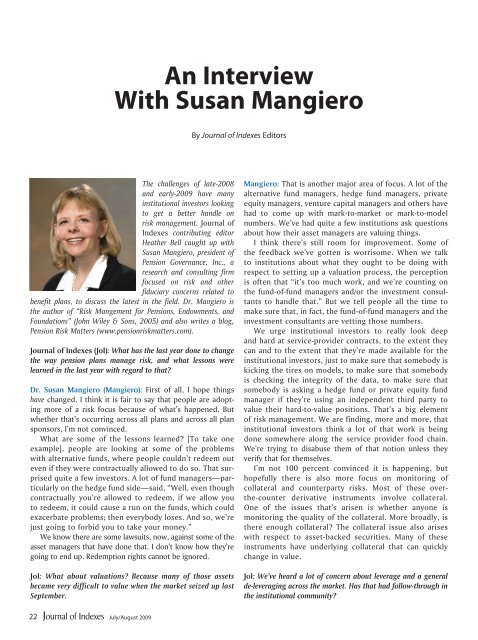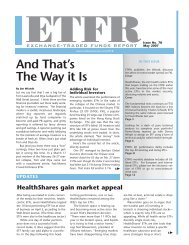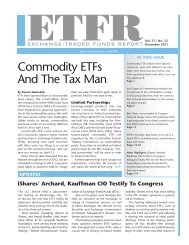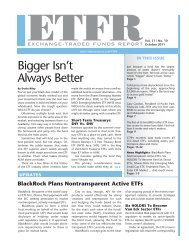How to Kill a Black Swan Remy Briand and David Owyong ...
How to Kill a Black Swan Remy Briand and David Owyong ...
How to Kill a Black Swan Remy Briand and David Owyong ...
You also want an ePaper? Increase the reach of your titles
YUMPU automatically turns print PDFs into web optimized ePapers that Google loves.
An Interview<br />
With Susan Mangiero<br />
By Journal of Indexes Edi<strong>to</strong>rs<br />
The challenges of late-2008<br />
<strong>and</strong> early-2009 have many<br />
institutional inves<strong>to</strong>rs looking<br />
<strong>to</strong> get a better h<strong>and</strong>le on<br />
risk management. Journal of<br />
Indexes contributing edi<strong>to</strong>r<br />
Heather Bell caught up with<br />
Susan Mangiero, president of<br />
Pension Governance, Inc., a<br />
research <strong>and</strong> consulting firm<br />
focused on risk <strong>and</strong> other<br />
fiduciary concerns related <strong>to</strong><br />
benefit plans, <strong>to</strong> discuss the latest in the field. Dr. Mangiero is<br />
the author of “Risk Mangement for Pensions, Endowments, <strong>and</strong><br />
Foundations” (John Wiley & Sons, 2005) <strong>and</strong> also writes a blog,<br />
Pension Risk Matters (www.pensionriskmatters.com).<br />
Journal of Indexes (JoI): What has the last year done <strong>to</strong> change<br />
the way pension plans manage risk, <strong>and</strong> what lessons were<br />
learned in the last year with regard <strong>to</strong> that?<br />
Dr. Susan Mangiero (Mangiero): First of all, I hope things<br />
have changed. I think it is fair <strong>to</strong> say that people are adopting<br />
more of a risk focus because of what’s happened. But<br />
whether that’s occurring across all plans <strong>and</strong> across all plan<br />
sponsors, I’m not convinced.<br />
What are some of the lessons learned? [To take one<br />
example], people are looking at some of the problems<br />
with alternative funds, where people couldn’t redeem out<br />
even if they were contractually allowed <strong>to</strong> do so. That surprised<br />
quite a few inves<strong>to</strong>rs. A lot of fund managers—particularly<br />
on the hedge fund side—said, “Well, even though<br />
contractually you’re allowed <strong>to</strong> redeem, if we allow you<br />
<strong>to</strong> redeem, it could cause a run on the funds, which could<br />
exacerbate problems; then everybody loses. And so, we’re<br />
just going <strong>to</strong> forbid you <strong>to</strong> take your money.”<br />
We know there are some lawsuits, now, against some of the<br />
asset managers that have done that. I don’t know how they’re<br />
going <strong>to</strong> end up. Redemption rights cannot be ignored.<br />
JoI: What about valuations? Because many of those assets<br />
became very difficult <strong>to</strong> value when the market seized up last<br />
September.<br />
Mangiero: That is another major area of focus. A lot of the<br />
alternative fund managers, hedge fund managers, private<br />
equity managers, venture capital managers <strong>and</strong> others have<br />
had <strong>to</strong> come up with mark-<strong>to</strong>-market or mark-<strong>to</strong>-model<br />
numbers. We’ve had quite a few institutions ask questions<br />
about how their asset managers are valuing things.<br />
I think there’s still room for improvement. Some of<br />
the feedback we’ve gotten is worrisome. When we talk<br />
<strong>to</strong> institutions about what they ought <strong>to</strong> be doing with<br />
respect <strong>to</strong> setting up a valuation process, the perception<br />
is often that “it’s <strong>to</strong>o much work, <strong>and</strong> we’re counting on<br />
the fund-of-fund managers <strong>and</strong>/or the investment consultants<br />
<strong>to</strong> h<strong>and</strong>le that.” But we tell people all the time <strong>to</strong><br />
make sure that, in fact, the fund-of-fund managers <strong>and</strong> the<br />
investment consultants are vetting those numbers.<br />
We urge institutional inves<strong>to</strong>rs <strong>to</strong> really look deep<br />
<strong>and</strong> hard at service-provider contracts, <strong>to</strong> the extent they<br />
can <strong>and</strong> <strong>to</strong> the extent that they’re made available for the<br />
institutional inves<strong>to</strong>rs, just <strong>to</strong> make sure that somebody is<br />
kicking the tires on models, <strong>to</strong> make sure that somebody<br />
is checking the integrity of the data, <strong>to</strong> make sure that<br />
somebody is asking a hedge fund or private equity fund<br />
manager if they’re using an independent third party <strong>to</strong><br />
value their hard-<strong>to</strong>-value positions. That’s a big element<br />
of risk management. We are finding, more <strong>and</strong> more, that<br />
institutional inves<strong>to</strong>rs think a lot of that work is being<br />
done somewhere along the service provider food chain.<br />
We’re trying <strong>to</strong> disabuse them of that notion unless they<br />
verify that for themselves.<br />
I’m not 100 percent convinced it is happening, but<br />
hopefully there is also more focus on moni<strong>to</strong>ring of<br />
collateral <strong>and</strong> counterparty risks. Most of these overthe-counter<br />
derivative instruments involve collateral.<br />
One of the issues that’s arisen is whether anyone is<br />
moni<strong>to</strong>ring the quality of the collateral. More broadly, is<br />
there enough collateral? The collateral issue also arises<br />
with respect <strong>to</strong> asset-backed securities. Many of these<br />
instruments have underlying collateral that can quickly<br />
change in value.<br />
JoI: We’ve heard a lot of concern about leverage <strong>and</strong> a general<br />
de-leveraging across the market. Has that had follow-through in<br />
the institutional community?<br />
22<br />
July/August 2009
















